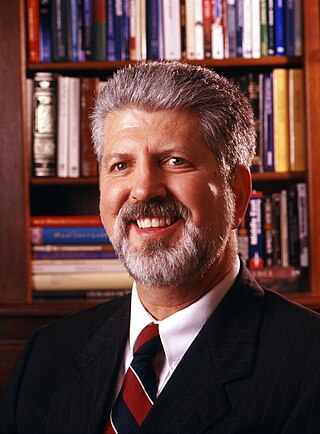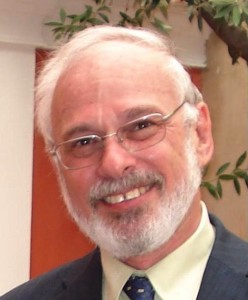Related Research Articles
A psychiatrist is a physician who specializes in psychiatry. Psychiatrists are physicians and evaluate patients to determine whether their symptoms are the result of a physical illness, a combination of physical and mental ailments or strictly mental issues. Sometimes a psychiatrist works within a multi-disciplinary team, which may comprise clinical psychologists, social workers, occupational therapists, and nursing staff. Psychiatrists have broad training in a biopsychosocial approach to the assessment and management of mental illness.
The American Psychiatric Association (APA) is the main professional organization of psychiatrists and trainee psychiatrists in the United States, and the largest psychiatric organization in the world. It has more than 37,000 members who are involved in psychiatric practice, research, and academia representing a diverse population of patients in more than 100 countries. The association publishes various journals and pamphlets, as well as the Diagnostic and Statistical Manual of Mental Disorders (DSM). The DSM codifies psychiatric conditions and is used mostly in the United States as a guide for diagnosing mental disorders.
Lisa Dixon is a Professor of Psychiatry at the Columbia University Irving Medical Center and the Director of the Division of Behavioral Health Services and Policy Research within the Department of Psychiatry. Her research focuses on improving the quality of care for individuals diagnosed with serious mental illnesses. She directs the Center for Practice Innovations (CPI) at the New York State Psychiatric Institute, where she oversees the implementation of evidence-based practices for individuals with serious mental illnesses for the New York State Office of Mental Health. She leads OnTrackNY, a statewide treatment program for adolescents and young adults experiencing their first episode of psychosis.
Nancy Coover Andreasen is an American neuroscientist and neuropsychiatrist. She currently holds the Andrew H. Woods Chair of Psychiatry at the Roy J. and Lucille A. Carver College of Medicine at the University of Iowa.
Psychiatric genetics is a subfield of behavioral neurogenetics and behavioral genetics which studies the role of genetics in the development of mental disorders. The basic principle behind psychiatric genetics is that genetic polymorphisms are part of the causation of psychiatric disorders.
Child and adolescent psychiatry is a branch of psychiatry that focuses on the diagnosis, treatment, and prevention of mental disorders in children, adolescents, and their families. It investigates the biopsychosocial factors that influence the development and course of psychiatric disorders and treatment responses to various interventions. Child and adolescent psychiatrists primarily use psychotherapy and/or medication to treat mental disorders in the pediatric population.

Irving Isadore Gottesman was an American professor of psychology who devoted most of his career to the study of the genetics of schizophrenia. He wrote 17 books and more than 290 other publications, mostly on schizophrenia and behavioral genetics, and created the first academic program on behavioral genetics in the United States. He won awards such as the Hofheimer Prize for Research, the highest award from the American Psychiatric Association for psychiatric research. Lastly, Gottesman was a professor in the psychology department at the University of Minnesota, where he received his Ph.D.
Steven Edward Hyman is Director of the Stanley Center for Psychiatric Research at the Broad Institute of MIT and Harvard in Cambridge, Massachusetts. He is also Harvard University Distinguished Service Professor of Stem Cell and Regenerative Biology. Hyman was Provost of Harvard University from 2001 to 2011 and before that Director of the U.S. National Institute of Mental Health (NIMH) from 1996 to 2001. Hyman received the 2016 Rhoda and Bernard Sarnat International Prize in Mental Health from the National Academy of Medicine for "leadership in furthering understanding and treatment of psychiatric disorders as biological diseases".

Claude Robert Cloninger is an American psychiatrist and geneticist noted for his research on the biological, psychological, social, and spiritual foundation of both mental health and mental illness. He previously held the Wallace Renard Professorship of Psychiatry, and served as professor of psychology and genetics, as well as director of the Sansone Family Center for Well-Being at Washington University in St. Louis. Cloninger is a member of the evolutionary, neuroscience, and statistical genetics programs of the Division of Biology and Biomedical Sciences at Washington University, and is recognized as an expert clinician in the treatment of general psychopathology, substance dependence, and personality disorders. Dr. Cloninger is currently professor emeritus.

Lee Nelken Robins was an American professor of social science in psychiatry and a leader in psychiatric epidemiology research. She was affiliated with the Washington University in St. Louis for more than 50 years from 1954 until 2007.
Jules Angst is a Swiss academic who is Emeritus Professor of Psychiatry at Zurich University in Zurich, Switzerland, and Honorary Doctor of Heidelberg University in Heidelberg, Germany.
The following outline is provided as an overview of and topical guide to psychiatry:
Terrie Edith Moffitt is an American clinical psychologist who is best known for her pioneering research on the development of antisocial behavior and for her collaboration with colleague and partner Avshalom Caspi in research on gene-environment interactions in mental disorders.

Judith L. Rapoport is an American psychiatrist. She is the chief of the Child Psychiatry Branch at the National Institute of Mental Health (NIMH), part of the National Institutes of Health (NIH) in Bethesda, Maryland.
Nancy M. Petry was a psychologist known for her research on behavioral treatments for addictive disorders, behavioral pharmacology, impulsivity and compulsive gambling. She was Professor of Medicine at the University of Connecticut Health Center. Petry served as a member of the American Psychiatric Association Workgroup on Substance Use Disorders for the DSM-5 and chaired the Subcommittee on Non-Substance Behavioral Addictions. The latter category includes Internet addiction disorder and problem gambling. She also served as a member of the Board of Advisors of Children and Screens: Institute of Digital Media and Child Development.

Kathleen Ries Merikangas is the Chief of the Genetic Epidemiology Research Branch in the Intramural Research Program at the National Institute of Mental Health (NIMH) and an adjunct professor of epidemiology at the Johns Hopkins Bloomberg School of Public Health. She has published more than 300 papers, and is best known for her work in adolescent mental disorders.
Ming Tso Tsuang is an American psychiatrist and Distinguished Professor of Psychiatry at the University of California, San Diego. He is considered a pioneering researcher in the genetic epidemiology of schizophrenia and other severe mental disorders. Tsuang has authored and co-authored more than 600 publications and serves as founding and senior editor of the American Journal of Medical Genetics Part B.
The Psychiatric Genomics Consortium (PGC) is an international consortium of scientists dedicated to conducting meta- and mega-analyses of genomic-wide genetic data, with a focus on psychiatric disorders. It is the largest psychiatric consortium ever created, including over 800 researchers from 38 countries as of 2019. Its goal is to generate information about the genetics of psychiatric conditions that will be "actionable", that is, "genetic findings whose biological implications can be used to improve diagnosis, develop rational therapeutics, and craft mechanistic approaches to primary prevention". The consortium makes the main findings from its research freely available for use by other researchers.

Prof. Robert Haim Belmaker, is an Israeli psychiatrist who has had major academic positions in Israeli psychiatry since 1974. He had a formative influence on biological directions in Israeli psychiatry. He was Hoffer-Vickar Professor of Psychiatry at Ben-Gurion University of the Negev, Beersheva Israel until his retirement and is now Emeritus.

Linda A. Teplin is an American behavioral scientist and public health researcher. Her research focuses on the interface between mental health and the criminal justice system, criminalization of the mentally ill, and mental health needs and related health outcomes of incarcerated populations, including those in juvenile detention, jails, and prisons. Many of her published papers investigate the prevalence of psychiatric disorders, mortality, patterns of crime victimization, health service utilization, disproportionate incarceration of minorities, and HIV/AIDS risk behaviors. Her research has provided the empirical basis for changes in public health and criminal justice policy.
References
- ↑ "Arpana Agrawal, PhD". Department of Psychiatry. Washington University School of Medicine. Retrieved 2019-07-12.
- ↑ "Substance Use Disorders Working Group – PGC" . Retrieved 2023-03-15.
- ↑ "ISPG Honorific Awards". International Society of Psychiatric Genetics. Retrieved 2019-07-12.
- ↑ "Historical Tables: Awards and Program Chairs and Hosts | Behavior Genetics Association". bga.org. Retrieved 2023-03-15.
- ↑ "Annual Awards". researchsocietyonalcohol.org. Retrieved 2023-03-15.